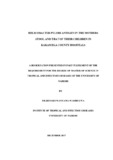| dc.contributor.author | Wambulwa, Benard W | |
| dc.date.accessioned | 2018-01-30T05:42:48Z | |
| dc.date.available | 2018-01-30T05:42:48Z | |
| dc.date.issued | 2017 | |
| dc.identifier.uri | http://hdl.handle.net/11295/102871 | |
| dc.description.abstract | Background:Helicobacter pylori prevalence in children may be affected by
the infection status of the mother as speculated by recent studies and the family
socio-economic status. Studies done in Kenya have not tried to establish an
association between the mothers’ infection status and that of their children. In
families where the mother spends most of her time with the child, it is thought
that she plays a major role in transmission.
Main Objective: To establish the association between presence of H.Pylori
antigen in mothers stool and that of their children in Kakamega County.
Design: Cross sectional study
Methodology: A total of 492 Mothers and children who met the inclusion
criteria were recruited by consecutive sampling through mother-child pairing;
but 430 were tested and included in the final analysis. Their H. pylori infection
status was determined by testing for H. pylori antigens in their stool samples
using the lateral flow chromatographic immunoassay method and was
documented as negative or positive. The family socioeconomic status (SES)
was assessed using the modified Hollingshead four factor indexes for SES
assessment.
vi
Results: The prevalence of H. pylori stool antigen in children was 21.8% and
18.7% in of mothers while study population prevalence was 20 %. There was a
statistically significant association between mothers H. pylori Stool Antigen
Test (SAT) results and that of their children’s (value<0.001). The proportion of
mother-child- positive (37%) was 2.7 times that of mother-negative-child
positive (13.7%). Children with H. pylori SAT positive results were 5 times
more likely to have a mother with a positive H. pylori SAT result compared to
those with negative result which was statistically significant (p-value <0.001).
Only the association between mother’s H. pylori SAT results and economic
status of the family was statistically significant (p value<0.05).
Conclusion: The study strengthens previous evidence that there’s an
association between the H. pylori infection status of the mother and their
children. The prevalence in children has reduced compared to similar studies
conducted in Kenya. The effect of the family social economic status on
infection status of the children was not clearly demonstrated in this study. | en_US |
| dc.language.iso | en | en_US |
| dc.publisher | University of Nairobi | en_US |
| dc.rights | Attribution-NonCommercial-NoDerivs 3.0 United States | * |
| dc.rights.uri | http://creativecommons.org/licenses/by-nc-nd/3.0/us/ | * |
| dc.subject | Helicobacter Pylori Antigen in the Mothers Stool and That of Their Children in Kakamega County Hospitals | en_US |
| dc.title | Helicobacter Pylori Antigen in the Mothers Stool and That of Their Children in Kakamega County Hospitals | en_US |
| dc.type | Thesis | en_US |
| dc.description.department | a
Department of Psychiatry, University of Nairobi, ; bDepartment of Mental Health, School of Medicine,
Moi University, Eldoret, Kenya | |



